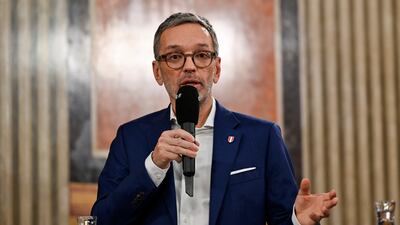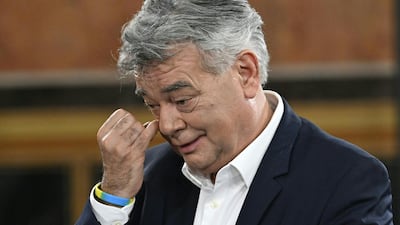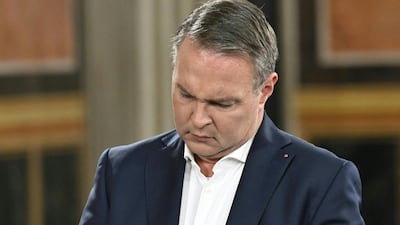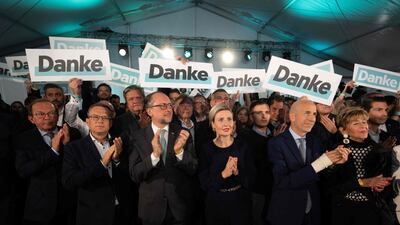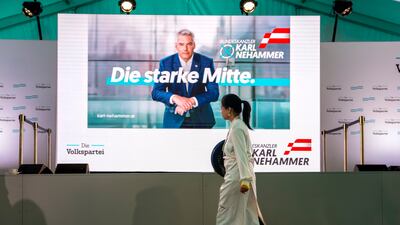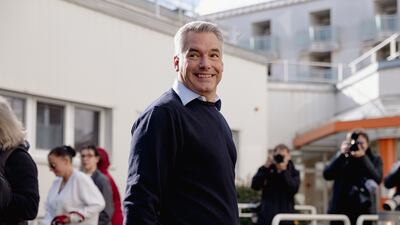Austria’s far-right Freedom Party claimed victory in the national elections on Sunday, marking a historic vote, but it could struggle to find governing partners.
The Freedom Party (FPO) was expected to narrowly beat the ruling conservatives but Sunday's results – which saw the party get about 29 per cent of the vote – were slightly better than anticipated.
However, all other parties have, so far rejected forming a coalition with its leader, Herbert Kickl.
“We have written a piece of history together today,” Mr Kickl told cheering party supporters in Vienna. “We have opened a door to a new era.”
Like other far-right parties elsewhere in Europe, the FPO has seen its popularity surge, fed by voter anger over migration, inflation and Covid restrictions.

Mr Kickl, a former interior minister and campaign strategist who has led the FPO since 2021, wants to become Austria’s chancellor on the back of the first far-right national election win in post-Second World War Austria.
Chancellor Karl Nehammer, who managed to close the gap to the FPO in recent weeks in opinion polls, said at his party headquarters that he could see the disappointment of party members.
“It was a race to catch-up, and unfortunately we didn't manage it,” said Mr Nehammer, 51, vowing to “continue to fight for the people's interests”.
The OeVP's support has plunged from more than 37 per cent in the last national election in 2019.
The Greens, with whom they governed in an unprecedented coalition, were also punished, falling to 8.3 per cent from almost 14 per cent in 2019.
In its election programme, titled Fortress Austria, the FPO calls for “remigration of uninvited foreigners”, for achieving a more “homogeneous” nation by tightly controlling borders and suspending the right to asylum seeker status with an “emergency law”.
The FPO also calls for an end to sanctions against Russia, is highly critical of western military aid to Ukraine and wants to leave the European Sky Shield Initiative, a missile defence project launched by Germany. Mr Kickl has criticised “elites” in Brussels and called for some powers to be brought back from the EU to Austria.

But to become Austria’s leader, he would need a coalition partner to command a majority in the lower house of parliament – and rivals have said they will not work with Mr Kickl in government.
“The voter has spoken. Change is wanted in our country,” FPO general secretary Michael Schnedlitz said.
More than 6.3 million people age 16 and over were eligible to vote for the new parliament in Austria, a EU member that has a policy of military neutrality.
Mr Kickl has achieved a turnaround since Austria’s last parliamentary election in 2019.
In June, the FPO narrowly won a nationwide vote for the first time in the European Parliament election, which also brought gains for other European far-right parties.
The party is a long-established political force but Sunday's projected result, if confirmed, would be its best yet in a national parliamentary election, beating the 26.9 per cent it scored in 1999.
In 2019, its support slumped to 16.2 per cent after a scandal brought down a government in which it was the junior coalition partner. Then vice chancellor and FPO leader Heinz-Christian Strache resigned following the publication of a secretly recorded video in which he appeared to offer favours to a purported Russian investor.
The leader of the Social Democrats, a party that led many of Austria’s post-Second World War governments, positioned himself as the polar opposite to Mr Kickl. Andreas Babler ruled out governing with the far right and has described Mr Kickl as “a threat to democracy”.
While the FPO has recovered, the popularity of Mr Nehammer’s People’s Party, which currently leads a coalition government with the Greens as junior partners, declined sharply compared with 2019.
The Greens' support also was projected to drop to just under 9 per cent, and the outgoing coalition appeared to be well short of a majority.
During the election campaign, Mr Nehammer portrayed his party, which has taken a tough line on immigration in recent years, as “the strong centre” that would guarantee stability amid crises.
But those crises, including rising energy prices and inflation, also cost it support. The government also angered many Austrians in 2022 with a short-lived coronavirus vaccine mandate, the first in Europe.

But the recent flooding caused by Storm Boris that hit Austria and other countries in Central Europe brought the environment back into the election debate and may have helped Mr Nehammer slightly narrow the gap with the FPO.
The People’s Party is the far right’s only way into government.
Mr Nehammer has described Mr Kickl as a “security risk” for Austria, but has not ruled out a coalition with the FPO in and of itself, which would imply Mr Kickl renouncing a position in government.
The likelihood of Mr Kickl agreeing to such a deal if he wins the election is very low, political scientist Peter Filzmaier said before the election.
The most probable alternative would be an alliance between the People’s Party and the Social Democrats – with or without the liberal Neos, which took about 9 per cent of the vote.
